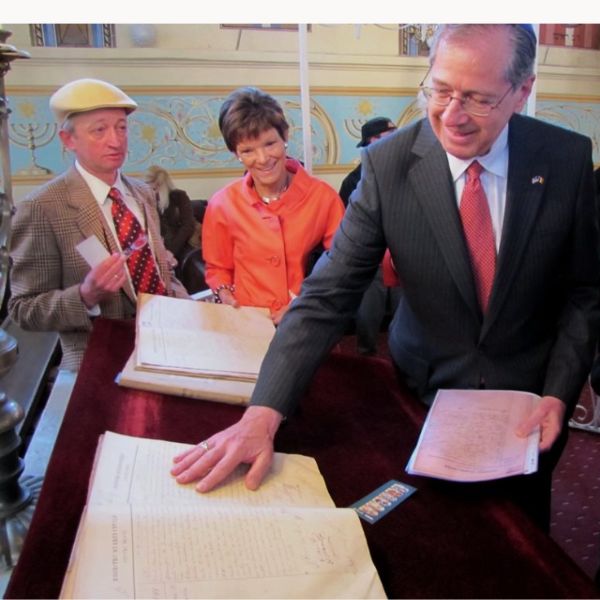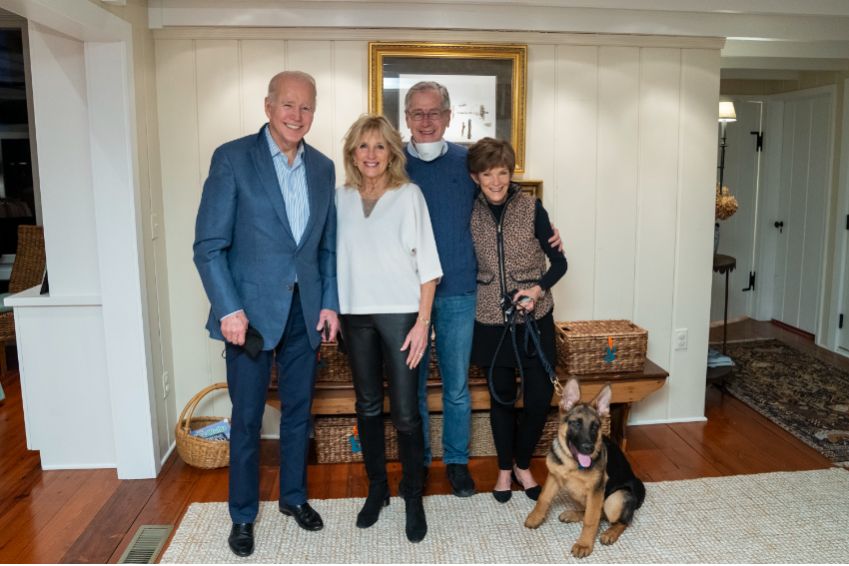“There has never been a time in history where there has been this level of collaboration between the European Union and the United States,” Mark Gitenstein, the United States ambassador to the European Union, tells The Parliament Magazine.
“I spent a lot of time talking to previous US ambassadors to the EU [and] other experts on the EU and the United States. And people say it’s never been more united.”
US President Joe Biden has made repairing American ties with Europe a key part of his foreign policy since entering the White House in early 2021, following the tempestuous years of the Donald Trump administration.
He decided to ask his best friend and former neighbour – his pal of nearly 50 years, Gitenstein – to help him do this by being his chief representative on the continent.
The senior diplomat started his new posting in January and in earnest, with Russian President Vladimir Putin launching his brutal attack on neighbouring Ukraine just a few weeks into Gitenstein’s tenure.
“I literally didn’t have a day off work in the first two months,” he says. “Every day I was on a video conference between high-level people in the US and EU. It was pretty intense.”
“[Putin] totally underestimated the unity between the two largest democratic systems in the world: the European Union and the United States. He thought the European Union itself would collapse under the stress. But it hasn’t, it has actually gotten stronger.”
But he says that in the short time he has spent living and working in Brussels, a period dominated by Russia’s ongoing – and so far, failed – attempt to overwhelm the defenders of Ukraine, it has quickly become clear to him that the relationship between the US and the EU is more robust than it has ever been – a strength of Western unity that he believes has “totally” caught President Putin, who he describes as “the most dangerous autocrat we face in the world right now,” off guard.
“He [Putin] is clearly threatened by a functioning free market and democracy in Ukraine,” says Gitenstein. “But more importantly, he totally underestimated the unity between the two largest democratic systems in the world: the European Union and the United States. He thought the European Union itself would collapse under the stress. But it hasn’t, it has actually gotten stronger.”
Born in a “little town” in Alabama in 1947, Gitenstein went to high school in Birmingham, where his formative years were “heavily influenced” by the historic demonstrations led by Martin Luther King Jr. Another influence at the time, he says, was Alabama federal judge Frank M Johnson Jr, whose landmark rulings on segregation and disenfranchisement helped desegregate the South.
Gitenstein went on to study at North Carolina’s Duke University, where he was involved in anti-war and civil rights work. He then attended law school at Georgetown University, paving the way to what is now a highly celebrated career in law.
One of his first jobs was working for a “reform-minded” attorney general in Montgomery, Alabama. Along with years at the US Senate, Gitenstein is also a former partner at the Mayer Brown law firm in Washington, DC.
Gitenstein describes his three-year tenure as the US ambassador to Romania as another key point in his professional life.

Ambassador Gitenstein is presented with the death records of an ancestor in Romania | Photo: US Embassy in Romania
He has deep ties to the southeastern European country, as his father’s mother came from Romania. His father’s father, meanwhile, immigrated from next-door Moldova.
During his tenure as ambassador to Romania, Gitenstein visited the town of Botoșani, where his paternal grandmother’s family originated. He recalls an “extremely emotional moment” when, on live television, at the only synagogue still standing in Botoșani, a genealogist presented him with the death certificate of his great, great grandfather. The moment also came with a revelation about his father’s Hebrew name, which Gitenstein had assumed came from a famous rabbi. In fact, he says, “he was named after this guy [his great, great grandfather].”
“Unfortunately, my father had passed away six months before, so I was not able to tell him. I was almost in tears when they presented it to me. It tied me to that city in a way that I was not prepared for.”
Gitenstein’s diplomatic mission in Romania started not long after it had joined the EU, and he was tasked with helping the former communist country with its transition as a new Member State. One of his challenges was improving the conditions for the Roma minority population, who, according to the European Centre for Minority Issues (ECMI), continue to “face discrimination in all areas of life.” “The great thing about the Romanians is they really tried to deal with it,” he says. “I was impressed and supportive of that.”
“I often got into arguments with Romanians about why they had to do this change or that change. And I said because you made the decision to join the European Union and you’re bound by those rules.” Gitenstein harks back to his home state as he adds: “Just like Alabama, as a member of the United States, having re-entered the United States after the Civil War, [being] bound by the 14th amendment to the Constitution which prohibited discrimination on the basis of race.”
In a 2009 speech in Bucharest, where he was serving as ambassador, then-Vice President Biden referred to Gitenstein as his “best personal friend.” Indeed, few people can boast having had a bigger impact on President Biden’s life than Gitenstein, who is now 75. The pair met as young fathers in their early 30s and worked closely together in the United States Senate. From 1981 to 1989, Gitenstein served first as minority chief counsel and then chief counsel to the Senate Judiciary Committee, which then-Senator Biden chaired from 1987 to 1995.
 The Bidens and Gitensteins have dinner at home in December, 2021|Photo: Courtesy Ambassador Gitenstein
The Bidens and Gitensteins have dinner at home in December, 2021|Photo: Courtesy Ambassador Gitenstein
Over the years, the professional and personal lives of President Biden and Gitenstein intersected to such a degree that the two became highly trusted confidantes. The latter acted as the former’s lawyer while he was being vetted as Barack Obama’s vice-presidential candidate. Later, Gitenstein co-chaired Biden’s vice-presidential transition, and more recently played a key role in his presidential transition.
Gitenstein’s daughter, now in her 40s, was an intern for Biden and the two families now regard each other as relatives, even owning beach houses in Delaware 200 yards apart.
“I helped him figure out which house to buy,” says Gitenstein.
Before Biden was President, he “would show up in my front yard with his dog and we would take a walk together... We spent most of our time talking about personal stuff [like] the raising of our kids and our grandchildren.”
“He showed up with all his security and it was very overwhelming,” Gitenstein says. “All of a sudden it hit me like a ton of bricks: he is no longer just my friend, he’s the President of the United States.”
In November 2020, not long after defeating Trump in the last US presidential election, the then President-elect and his swarm of security guards swung by the Gitenstein household to say hello.
“He showed up with all his security and it was very overwhelming,” Gitenstein says. “All of a sudden it hit me like a ton of bricks: he is no longer just my friend, he’s the President of the United States.”
“It was both a happy and a sad moment,” he adds, “because I knew it would be harder for him to just walk out the front door and just show up at my house... It will probably be like that for the rest of his life.”
Whenever he’s able to get away, Gitenstein, a self-proclaimed “history buff,” relishes a wander around Brussels as a way of “disengaging” from the pressures of his diplomatic role: “It’s a fascinating city! It’s 1000 years old. There’s a lot of history here”.
He also likes to paint watercolours, although he insists “I’m not very good at it”, of scenes in the Belgian countryside close to where he lives.
But with global turbulence showing no signs of abating any time soon, Gitenstein anticipates many more long nights in his Brussels office, and the watercolours may have to wait.
Sign up to The Parliament's weekly newsletter
Every Friday our editorial team goes behind the headlines to offer insight and analysis on the key stories driving the EU agenda. Subscribe for free here.